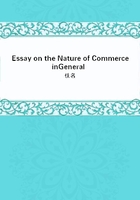
第46章
And last Of the Causes of the Increase and Decrease of the Interest of Money in a State It is a common idea, received of all those who have written on trade, that the increased quantity of currency in a state brings down the price of interest there, because when money is plentiful it is more easy to find some to borrow. This idea is not always true or accurate. For proof it needs only to be recalled that in 1720, nearly all the money in England was brought to London and over and above this the number of notes put out accelerated the movement of money extraordinarily. Yet this abundance of money and currency instead of lowering the current rate of interest which was before at 5 per cent and under, served only to increase the rate which was carried up to 50 and 60 per cent. It is easy to account for this increased rate of interest by the principles and the causes of interest laid down in the previous chapter. The reason is that everybody had become an undertaker in the South Sea scheme and wanted to borrow money to buy shares, expecting to make an immense profit out which it would be easy to pay this high rate of interest.
If the abundance of money in the state comes from the hands of moneylenders it will doubtless bring down the current rate of interest by increasing the number of money lenders: but if it comes from the intervention of spenders it will have just the opposite effect and will raise the rate of interest by increasing the number of Undertakers who will have employment from this increased expense, and will need to borrow to equip their business in all classes of interest.
Plenty or scarcity of money in a state always raises or lowers the price of everything in bargaining without any necessary connection with the rate of interest, which may very well be high in states where there is plenty of money and low in those where money is scarcer: high where everything is dear, and low where everything is cheap: high in London, low in Genoa.
The rate of interest rises and falls every day upon mere rumours which tend to diminish or increase the security of lenders, without the prices of things in exchange being affected thereby.
The most regular cause of a high rate of interest in a state is the great expense of nobles and landowners or other rich people. Undertakers and master craftsmen are in the custom of supplying the great houses in all their branches of expenditure.
These Undertakers have nearly always need to borrow money in order to supply them: and when the nobility consume their revenues in advance and borrow money they contribute doubly to raise the rate of interest.
On the contrary when the nobility of the state live economically and buy at first hand so far as they can, they get through their servants many things without their passing through the hands of Dealers, they diminish the profits and numbers of the Undertakers in the state and therefore of borrowers as well as the rate of interest, because this class of Undertakers working on their own capital borrow the least they can, and contenting themselves with small profits prevent those who have no capital from embarking in these enterprises on borrowed money.
Such is today the position of the Republics of Genoa and Holland, where interest is sometimes at 2 per cent or under in the highest class, whilst in Germany, Poland, France, Spain, England and other countries the easiness and expense of noblemen and landowners always keep the Undertakers and master craftsmen of the country accustomed to large profits enabling them to pay a high rate of interest, which is higher still when they import everything from abroad with attendant risk.
When the Prince or the state incurs heavy expense, such as making war, the rate of interest is raised for two such as making war, the rate of interest is raised for two reasons: the first is that this multiplies the number of Undertakers by several new large enterprises for war supplies, and so increases borrowing.
The second is because of the greater risk which war always involves.
On the contrary when the war is over risk diminishes, the number of Undertakers is lessened and war-contractors ceasing to be so retrench their expenses and become lenders of the money they have gained. If now the Prince or state offer to repay part of the debt it will interest, and this will have considerably reduce the rate of interest, and this will have a more assured result if part of the debt can be really paid off without borrowing elsewhere, because the repayments increase the number of lenders in the highest class of interest which will affect all the other classes.